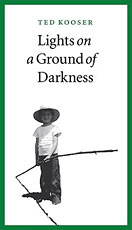Ted Kooser, a winner of the Pulitzer Prize in Poetry and former U.S. poet laureate, is Presidential Professor of the University of Nebraska. He is the author of 12 books of poetry and an award-winning prose book Local Wonders: Seasons in the Bohemian Alps. In this beautifully written volume, Kooser salutes his mother and her family. He admits in the preface to postponing this work because he wanted it to be perfect. Yet with luck, he finished it and got the manuscript to her just before she died. She read it and was quite impressed.
In a poem at the start of Lights on a Ground of Darkness, Kooser says of his mother:
Were it not for the way you taught me to look
at the world, to see the life at play in everything,
I would have been lonely forever.
The author brings all our senses alive with this evocation of a time and a place:
"The little town of Guttenberg, Iowa, is taking a midday nap under the trees on the bank of the river. Its wide streets are quiet, its window shades drawn down against the heat. Old elms sprinkle the deserted sidewalks with lacy, drifting patterns. There's a light breeze off the water, carrying the smell of fish and the soft, regular sound of waves lapping the sides of tied-up boats."
Kooser's working-class grandparents on his mother's side live in a house next to a filling station on the edge of town in 1949. He recalls a two-week visit to them with his mother the summer when he was ten. Everyone watches over Uncle Elvy who has cerebral palsy and occasional seizures. Kooser's grandfather is a colorful character, a robust man who runs the filling station, always votes Democrat, smokes a pipe, loves to sing, eats pickles every day and outlives almost everyone else in the family. The author remembers his hands:
"He has the kind of strong, warm hands that a child can never forget, the kind that seem to hold sun in their skin and that know exactly what to do in any tearful emergency: how to fix a cap pistol when the hammer has fallen out with a heartbreaking clink, or how to pull a fishhook out of the ball of your thumb."
Kooser writes about other relatives in this extended family and then watches helplessly as death takes away his grandfather, his Uncle Elvy, and his own father. They all leave the writer to harvest the past as best he can. And that spiritual task of connections, Kooser manages extremely well.
